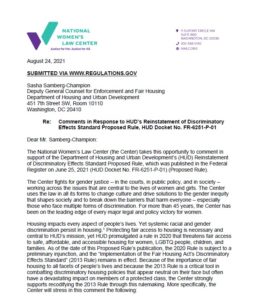Abortion rights, women of color, and LGBTQI+ people are under attack. Pledge to join us in fighting for gender justice.
 Access to safe and affordable housing in integrated neighborhoods is vital to the well-being of women and girls. Housing impacts health, education, food security, employment, and access to public programs that help families with low incomes meet basic needs. Disparate impact under the Fair Housing Act (FHA) is vital to preventing and addressing housing policies and practices that have a discriminatory effect based on sex, race, familial status, disability, and other protected characteristics under the FHA.
Access to safe and affordable housing in integrated neighborhoods is vital to the well-being of women and girls. Housing impacts health, education, food security, employment, and access to public programs that help families with low incomes meet basic needs. Disparate impact under the Fair Housing Act (FHA) is vital to preventing and addressing housing policies and practices that have a discriminatory effect based on sex, race, familial status, disability, and other protected characteristics under the FHA.
Under the Trump administration, the U.S. Department of Housing and Urban Development (HUD) released a rule in 2020 that gutted the disparate impact standard and would make it nearly impossible for plaintiffs to prove discrimination. Because of several defects in the 2020 Rule, a federal court blocked it from going into effect. HUD now proposes to recodify the 2013 disparate impact rule, which has served as a useful and workable framework to challenge discriminatory policies and practices. The National Women’s Law Center submitted this comment critiquing the 2020 Rule and in support of recodifying the 2013 Rule so that women, LGBTQ people, and their families can access fair housing.

